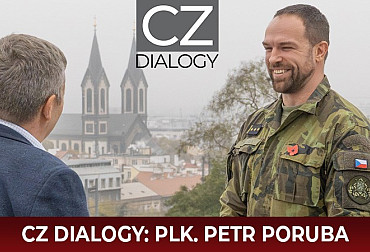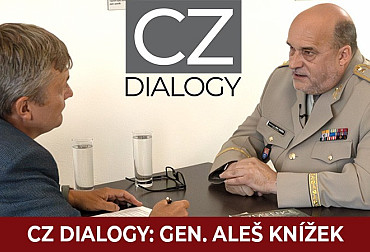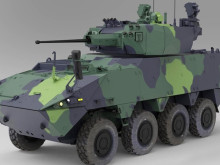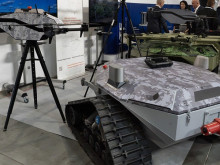Tomáš Kopečný: Widely available information logically serves only the enemy
The Czech Republic continues to be one of the leaders in assistance to Ukraine, not only in the supply of ammunition and military equipment. The scope of this cooperation is expanding. There are joint ventures in arms production both in Ukraine and in our country. Czech defence companies are opening operations directly in Ukraine. However, the Czech Republic's assistance is also focused on health, energy reconstruction, transport and other areas. We regularly discuss how the mutual cooperation between the Czech Republic and Ukraine is gradually changing and developing in our CZ DIALOGUES program with the Government Commissioner for Reconstruction of Ukraine, Tomáš Kopečný, who accepted our invitation this time as well.
Video: Interview with Tomáš Kopečný, Government Commissioner for Reconstruction of Ukraine / CZ DEFENCE
As far as the structure of aid to Ukraine is concerned, according to Tomáš Kopečný, not much has changed recently. However, changes are occurring on the battlefield. These include the turnaround in the Sumy region of Ukraine, where the Ukrainian army has managed to launch a counter-offensive towards Kursk. "It's also significant from the perspective that they broke through two lines of Russian defenders very quickly and easily," Kopečný says, adding that this was a courageous act by the Ukrainians that intelligence reports indicate the Russian side did not anticipate. "They rightly refer to it as a major intelligence failure of the Russian military internal and external services. Because the fact that they were unable to notice the deployment of a relatively large number of troops and heavy combat equipment, they showed once again demonstrates that Russia is not invincible," the government's commissioner for Ukraine's reconstruction explained. In this context, Kopečný also highlights the emotional impact of this action, specifically Ukraine's shift from constant defense and witnessing the destruction of infrastructure to taking the offensive, which serves as a strong morale boost for Ukraine.
Alongside this Ukrainian activity, it is still necessary to recognize the continuous strong pressure on the Russian army's advance, especially in the Donetsk region, and its constant efforts to attack civilian objects and the infrastructure of Ukrainian cities such as Kharkiv and Kryvyi Rih. It was here that the last Czech business delegation visited in the spring of this year. We wondered whether this complication is hampering our assistance, and whether it is even possible in this area. Tomáš Kopečný says that he does not like to specify too openly where exactly our mission will operate. The exception is Kyiv. He believes that the area of western and central Ukraine is still relatively safe. "Of course it is also being tested by ballistic missiles and rockets, but it is far enough away from the front that you have enough time to find shelter. Despite the fact that the regions are being tested in this way, we are able to implement cooperation. And perhaps I would say because we are one of the few countries that go there, we are an inspiration for other countries," says Tomáš Kopečný. "Many other countries, also thanks to Czech representatives loudly advocating at the European Union level and at world forums, have decided to start sending their teams to eastern Ukraine, even relatively close to the front line," continues Tomáš Kopečný.
According to Kopečný, the purpose of the established function of the government commissioner for the reconstruction of Ukraine is being fulfilled. "We are helping Czech entrepreneurs establish themselves there. We are one of the most important suppliers of cogeneration units. This is probably the commodity that is most urgently in demand right now. It is energy equipment that produces electricity and heat from gas. And we've already been able to supply tens of millions of dollars worth of these, and more than 90% of that is paid for by foreign partners that we've convinced it can be done. We paid for the first CHP unit with Czech development money, nine more were paid for by the Taiwanese, and twenty more were paid for by the Americans," says Tomáš Kopečný, who also mentions that another example of international cooperation is the agreement to supply five Czech heat pumps paid for by Japan.
During the debate on aid to Ukraine, we could not avoid discussing the supply of ammunition, which is still in short supply on the Ukrainian side. However, in addition to the supply of ammunition to Ukraine, we also need to replenish our own stocks within European countries. So we asked, does Europe have the potential to produce more ammunition to meet its current needs? According to Kopečný, it does, and the key to this solution lies in meeting two basic levels and variables, namely sufficient finance and time, with finance being the key to obtaining sufficient raw materials. "You need to know that you have the capital to either buy the production capacity or possibly the raw material itself. That means you have something to pay with," explains the Ukraine Reconstruction Commissioner, adding that this no longer refers to the state as an institution, but to individual companies that have a contract from the state. These companies, when they have enough long-term contracts, can then buy raw materials to stock up and not be caught off guard by varying delivery times. "And that's why emphasize the importance of time at the moment when some Western governments have already accepted the reality that we are not just talking about what can be delivered in a few months. The conflict is going to be with us here for a number of long years, and so it makes sense to contract with companies that will deliver goods in, say, 12 or 24 months. Logically, the total production capacity will also increase. We do not buy what has already been produced. We very often buy production capacity. And we're not just talking about Czech or European companies, it's worldwide," explains Kopečný.
In this context, we touched on the current situation, when the Czech Ammunition Initiative is being attacked in the media and asked how much the attacks on wastefulness and non-transparency complicate the achievement of the Initiative's goals. According to Kopečný, not so much so far. Often it is an internal political debate that takes place across states, where the lines of discussion are drawn according to different criteria. Sometimes it is just a political effort behind it. As for references to transparency, Tomáš Kopečný says: "Just because something is transparent - it doesn't mean that it is publicly available information. It's not transparent on the part of the army to publish all the technical data about what a tank is made of or what frequencies the communication works on, that's nonsense. Widely available information logically only serves the enemy.
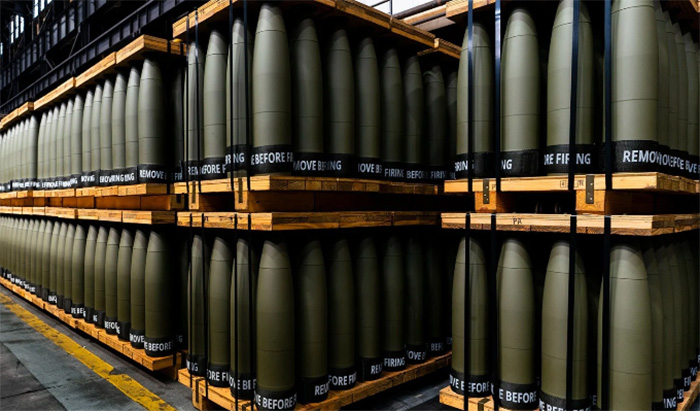
It is necessary to be transparent in this context, but according to some rules that are given by law. That is why we have classified information, so that the relevant committees in the House and Senate can ask questions about what they are interested in, how Czech public funds or the international reputation of the Czech Republic are being handled. This is perfectly legitimate," says Tomáš Kopečný, who does not rule out competing interests from other arms companies or within Ukraine. "A lot of Ukrainian companies have been profiting from supplying necessary materials, and these companies have been making a profit from that. The moment the army receives the product directly, it doesn't need these middlemen, and there is a layer of companies that are not happy with that," explains the government's commissioner for Ukraine's reconstruction. "What is important is that fifteen countries across governments and parliaments find the Czech system transparent enough to entrust their public funds to it. I feel good about that. And the same goes for the price. If any of those countries could find a cheaper deal, we would all be delighted. Firstly, we would have less work to do, and secondly, more will be delivered to Ukraine. That's great. That is the market. Offer it cheaper and they will rip your hands off," Kopečný said.
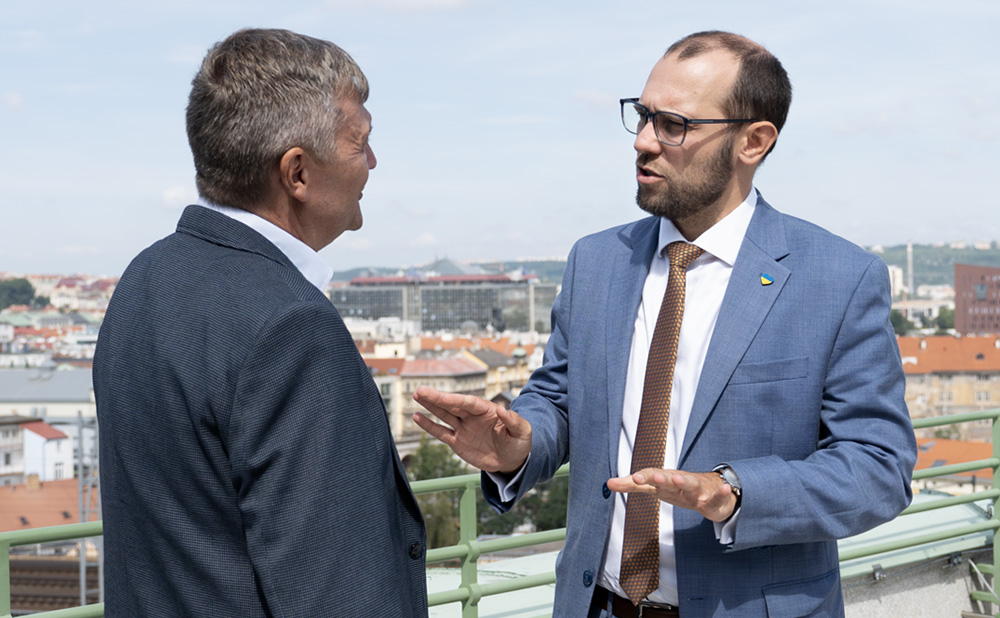
We also asked for an estimate of the further development of the war in Ukraine, what could happen in the next six months? According to Kopečný, Ukraine will still be at war because all estimates point to a long-term conflict. The next development of the war will have a lot to do with the energy situation and a completely new topic. "What is bubbling under the surface is the topic of mental health. Tens of thousands of people with severe mental trauma need acute care, they are attacking the medical staff who are treating them because they just can't handle it," Kopečný says. Another problem is the aforementioned energy situation, which results in the fact that people freezing to death. "Ukraine needs 13 gigawatts of power from its energy grid to prevent these people from freezing. Last winter it had 18, now it has 9, and we are trying to make sure that hundreds of thousands of people are not forced to move because of the cold. That movement will most likely be within Ukraine, just a little bit more to the west. But I think that's probably going to be the most serious issue," warns Tomáš Kopečný, the government's commissioner for Ukraine's reconstruction.
If you want to know more not only about the munitions initiative, about Belarus's position, what will happen with oil and gas supplies to Europe, or about the fatigue of the population from almost three years of war, listen to the full interview at the beginning of this article.















